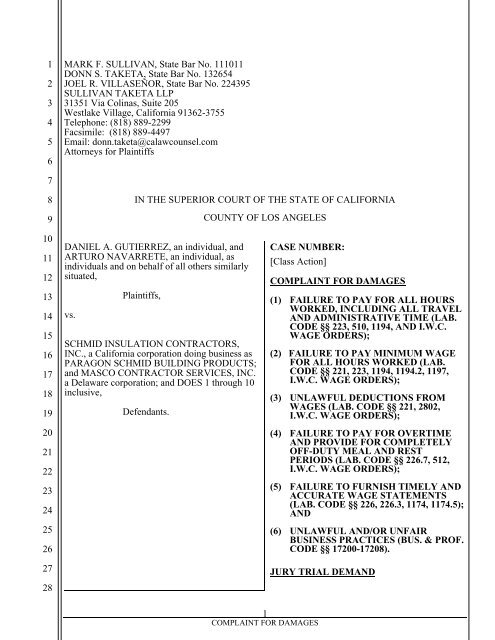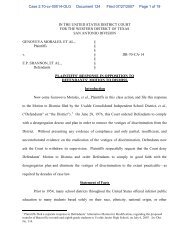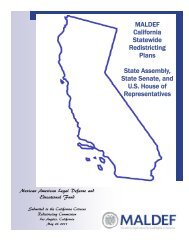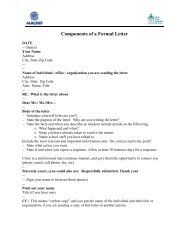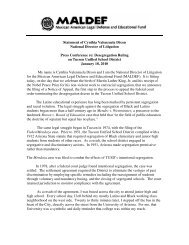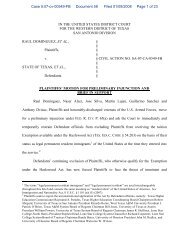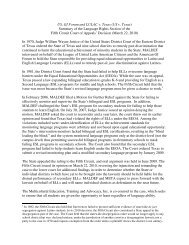Complaint - maldef
Complaint - maldef
Complaint - maldef
You also want an ePaper? Increase the reach of your titles
YUMPU automatically turns print PDFs into web optimized ePapers that Google loves.
1<br />
2<br />
3<br />
4<br />
5<br />
6<br />
MARK F. SULLIVAN, State Bar No. 111011<br />
DONN S. TAKETA, State Bar No. 132654<br />
JOEL R. VILLASEÑOR, State Bar No. 224395<br />
SULLIVAN TAKETA LLP<br />
31351 Via Colinas, Suite 205<br />
Westlake Village, California 91362-3755<br />
Telephone: (818) 889-2299<br />
Facsimile: (818) 889-4497<br />
Email: donn.taketa@calawcounsel.com<br />
Attorneys for Plaintiffs<br />
7<br />
8<br />
9<br />
IN THE SUPERIOR COURT OF THE STATE OF CALIFORNIA<br />
COUNTY OF LOS ANGELES<br />
10<br />
11<br />
12<br />
13<br />
14<br />
15<br />
16<br />
17<br />
18<br />
19<br />
20<br />
21<br />
22<br />
23<br />
24<br />
25<br />
26<br />
27<br />
28<br />
DANIEL A. GUTIERREZ, an individual, and<br />
ARTURO NAVARRETE, an individual, as<br />
individuals and on behalf of all others similarly<br />
situated,<br />
vs.<br />
Plaintiffs,<br />
SCHMID INSULATION CONTRACTORS,<br />
INC., a California corporation doing business as<br />
PARAGON SCHMID BUILDING PRODUCTS;<br />
and MASCO CONTRACTOR SERVICES, INC.<br />
a Delaware corporation; and DOES 1 through 10<br />
inclusive,<br />
Defendants.<br />
CASE NUMBER:<br />
[Class Action]<br />
COMPLAINT FOR DAMAGES<br />
(1) FAILURE TO PAY FOR ALL HOURS<br />
WORKED, INCLUDING ALL TRAVEL<br />
AND ADMINISTRATIVE TIME (LAB.<br />
CODE §§ 223, 510, 1194, AND I.W.C.<br />
WAGE ORDERS);<br />
(2) FAILURE TO PAY MINIMUM WAGE<br />
FOR ALL HOURS WORKED (LAB.<br />
CODE §§ 221, 223, 1194, 1194.2, 1197,<br />
I.W.C. WAGE ORDERS);<br />
(3) UNLAWFUL DEDUCTIONS FROM<br />
WAGES (LAB. CODE §§ 221, 2802,<br />
I.W.C. WAGE ORDERS);<br />
(4) FAILURE TO PAY FOR OVERTIME<br />
AND PROVIDE FOR COMPLETELY<br />
OFF-DUTY MEAL AND REST<br />
PERIODS (LAB. CODE §§ 226.7, 512,<br />
I.W.C. WAGE ORDERS);<br />
(5) FAILURE TO FURNISH TIMELY AND<br />
ACCURATE WAGE STATEMENTS<br />
(LAB. CODE §§ 226, 226.3, 1174, 1174.5);<br />
AND<br />
(6) UNLAWFUL AND/OR UNFAIR<br />
BUSINESS PRACTICES (BUS. & PROF.<br />
CODE §§ 17200-17208).<br />
JURY TRIAL DEMAND<br />
1<br />
COMPLAINT FOR DAMAGES
1<br />
2<br />
3<br />
4<br />
5<br />
6<br />
7<br />
8<br />
9<br />
10<br />
11<br />
12<br />
13<br />
14<br />
15<br />
16<br />
17<br />
18<br />
19<br />
20<br />
21<br />
22<br />
23<br />
24<br />
25<br />
26<br />
27<br />
28<br />
Plaintiffs DANIEL A. GUTIERREZ, and ARTURO NAVARRETE, on behalf of themselves<br />
and all others similarly situated (collectively referred to as “Plaintiffs”), complain and allege as<br />
follows:<br />
I. INTRODUCTION<br />
1. This is a class action, under California Code of Civil Procedure section 382, brought on<br />
behalf of construction personnel employed by, or on behalf of, defendants to install building-contractor<br />
products, such as gutters, fireplaces, firestopping, weather stripping, cabinets, garage doors,<br />
insulation/air filtration, central vacuum, and/or blow-in-blankets. The installation personnel have been<br />
denied pay for all hours worked, including being denied pay for time spent traveling to companyassigned<br />
work sites in company trucks, time spent setting up, preparing, or measuring at the job sites,<br />
as well as time spent loading, maintaining and unloading the company product and equipment. In<br />
addition, Plaintiffs are required not to record all of their time spent while at work on their time records,<br />
under the threat of not being paid at all. Defendants lure in the laborers by initially paying them on an<br />
hourly basis, and only later switching to payments based on a variable piece-rate basis, which results in<br />
the Plaintiffs routinely being denied pay for all hours worked, being denied overtime, and being<br />
subjected to unlawful deductions (e.g., “negative bonuses”) taken from their wages.<br />
2. This action seeks unpaid wages for all hours worked, reimbursement of all necessary<br />
work-related costs and expenses, reimbursement of unauthorized wage deductions, interest on unpaid<br />
wages, compensation for failure to furnish timely statements accurately showing total hours worked,<br />
and reasonable attorneys’ fees and costs, under, inter alia, Labor Code §§ 218.5, 218.6, 221, 223, 226,<br />
226.3, 226.7, 510, 512, 558, 1174.5, 1194, 1194.2, 1194.5, 1197, 1197.1, 2802, and Code of Civil<br />
Procedure § 1021.5, on behalf of Plaintiffs and all other persons who are or have been employed by<br />
SCHMID INSULATION CONTRACTORS, INC., a California corporation doing business as<br />
PARAGON SCHMID BUILDING PRODUCTS; and MASCO CONTRACTOR SERVICES, INC., a<br />
Delaware corporation; and DOES 1 through 10 inclusive (collectively “Defendants”). The plaintiffs<br />
all suffered unpaid wages for all hours worked based on Defendants’ purported “piece-rate” method as<br />
construction installation personnel within the State of California at any time since four years prior to<br />
2<br />
COMPLAINT FOR DAMAGES
1<br />
2<br />
3<br />
4<br />
5<br />
6<br />
the filing of this <strong>Complaint</strong>. Plaintiffs, on behalf of themselves and the putative class members<br />
(collectively referred to as “installers”), also seek restitution of all benefits Defendants have enjoyed<br />
from their failure to pay for all hours worked, failure to pay overtime wages, failure to provide<br />
accurate statements of hours worked to each Plaintiff and putative class member, failure to keep<br />
required payroll records, and seek injunctive relief under Business and Professions Code §§ 17200-<br />
17208.<br />
7<br />
8<br />
II.<br />
VENUE AND JURISDICTION<br />
9<br />
10<br />
11<br />
12<br />
13<br />
14<br />
15<br />
16<br />
17<br />
18<br />
3. Venue as to each Defendant is proper in this judicial district, pursuant to Code of Civil<br />
Procedure § 395(a). Each Defendant transacts business, maintains an office, and/or has an agent in<br />
Los Angeles County, and each Defendant is otherwise within this Court’s jurisdiction for purposes of<br />
service of process. The unlawful acts alleged herein have a direct effect on Plaintiffs and those<br />
similarly situated within the State of California and Los Angeles County. Defendants do substantial<br />
business in Los Angeles County, California, and have employed and currently employ numerous class<br />
members in Los Angeles County as well as throughout the State of California.<br />
4. The Court has jurisdiction over this class action pursuant to Article 6, § 10, of the<br />
California Constitution and California Code of Civil Procedure § 410.10.<br />
5. Each named Plaintiff’s monetary claims total less than $75,000.00 per person.<br />
19<br />
20<br />
III.<br />
THE PARTIES<br />
21<br />
22<br />
23<br />
24<br />
25<br />
26<br />
27<br />
28<br />
A. Plaintiffs<br />
6. The Named Plaintiffs and the members of the putative class as set forth below, all are<br />
current or former employees of Defendants who are or were employed within the construction field as<br />
installers of building products, such as gutters, fireplaces, firestopping, weather stripping, cabinets,<br />
garage doors, insulation/air filtration, central vacuum, and/or blow-in-blankets, within California and<br />
within the period beginning four years prior to the filing of the <strong>Complaint</strong> to the present. They are all<br />
“employees” as that term is used in the California Labor Code, and the California Industrial Welfare<br />
3<br />
COMPLAINT FOR DAMAGES
1<br />
2<br />
3<br />
4<br />
5<br />
6<br />
7<br />
8<br />
9<br />
10<br />
11<br />
Commission’s Wage Orders regulating wages, hours, and working conditions in the State of<br />
California.<br />
7. Plaintiff DANIEL A. GUTIERREZ, is a resident of Van Nuys, in Los Angeles County,<br />
California, and was employed by Defendants, from approximately January 2006, and is presently<br />
employed, as a rain gutter installer with experience in fire-place installation, working out of<br />
Defendants’ warehouse and offices at or near 24955 Kearney Avenue, Valencia, California, in the<br />
County of Los Angeles.<br />
8. Plaintiff ARTURO NAVARRETE, is a resident of Thousand Oaks, in Ventura County,<br />
California, and was employed by Defendants from approximately June 2006 until September 2006 as<br />
an installer working out of Defendants’ warehouse and office facilities located at or near 24955<br />
Kearney Avenue, Valencia, California, in the County of Los Angeles.<br />
12<br />
13<br />
14<br />
15<br />
16<br />
17<br />
18<br />
19<br />
20<br />
21<br />
22<br />
23<br />
24<br />
25<br />
26<br />
27<br />
B. Defendants<br />
9. Defendant SCHMID INSULATION CONTRACTORS, INC. is a California<br />
corporation doing business as PARAGON SCHMID BUILDING PRODUCTS.<br />
10. Defendant MASCO CONTRACTOR SERVICES, INC. is a Delaware corporation<br />
doing business in California as Paragon Schmid Building Products.<br />
11. Defendant MASCO CONTRACTOR SERVICES, INC., operates branch offices<br />
throughout the United States, including throughout California and in Los Angeles County. In addition,<br />
Schmid Insulation Contractors, Inc., Masco Contractor Services, Inc., and the other defendants<br />
constitute a “person” as defined in California Labor Code section 18, and an “employer” as that term is<br />
used in the California Labor Code and the IWC Wage Orders regulating wages, hours, and working<br />
conditions.<br />
12. The true names and capacities, whether individual, corporate, associate, or otherwise, of<br />
Defendants sued herein as DOES 1 through 10, inclusive, are currently unknown to Plaintiffs, who<br />
therefore sue Defendants by such fictitious names under Code of Civil Procedure § 474. Plaintiffs are<br />
informed and believe, and based thereon allege, that each of the Defendants designated herein as a<br />
28<br />
4<br />
COMPLAINT FOR DAMAGES
1<br />
2<br />
3<br />
4<br />
5<br />
6<br />
7<br />
8<br />
DOE is legally responsible in some manner for the unlawful acts referred to herein. Plaintiffs will seek<br />
leave of court to amend this <strong>Complaint</strong> to reflect the true names and capacities of the Defendants<br />
designated hereinafter as DOES when such identities become known.<br />
13. Plaintiffs are informed and believe, and based thereon allege, that each Defendant acted<br />
in all respects pertinent to this action as the agent of the other Defendants, carried out a joint scheme,<br />
business plan, control, or policy in all respects pertinent hereto, and the acts of each Defendant are<br />
legally attributable to the other Defendants. Plaintiffs are informed and believe, and on that basis<br />
allege that Defendants have joint operational control over Plaintiffs.<br />
9<br />
10<br />
IV.<br />
FACTUAL ALLEGATIONS<br />
11<br />
12<br />
13<br />
14<br />
15<br />
16<br />
17<br />
18<br />
19<br />
20<br />
21<br />
22<br />
23<br />
24<br />
25<br />
26<br />
27<br />
28<br />
14. Defendants have employed Plaintiffs and members of the proposed class as installers,<br />
who install and service Defendants’ building-contractor products, such as gutters, fireplaces,<br />
firestopping, weather stripping, cabinets, garage doors, insulation/air filtration, central vacuum, and/or<br />
blow-in-blankets. These construction installation personnel are initially paid on an hourly basis, but<br />
then switched to a purported piece-rate basis, and are routinely denied pay for all hours worked. The<br />
installation duties involving construction building products performed by the Plaintiffs and the putative<br />
class members are substantially similar, if not identical.<br />
15. For at least four years prior to the filing of this <strong>Complaint</strong> and continuing hereafter<br />
(hereinafter, “Liability Period”), Defendants have had the policy and practice of failing to compensate<br />
the installer Plaintiffs for all of the time worked and activities completed for the benefit of Defendants.<br />
16. Installers regularly perform work for the benefit of Defendants before they arrive at<br />
their first assignment and for which they receive no compensation. In the mornings, Defendants<br />
require their installers to report for work at a central meeting location and at a time specified by<br />
Defendants’ branch. When the installers arrive at the central meeting location at the specified time,<br />
they receive their assigned work orders for the day, pick up and load into their company vehicles<br />
equipment necessary for the completion of their orders, and route their orders by address. The<br />
installers then leave the central meeting location and drive in the company vehicles to their first<br />
5<br />
COMPLAINT FOR DAMAGES
1<br />
2<br />
3<br />
4<br />
5<br />
6<br />
7<br />
8<br />
9<br />
10<br />
11<br />
12<br />
13<br />
14<br />
15<br />
16<br />
17<br />
18<br />
19<br />
20<br />
21<br />
22<br />
23<br />
24<br />
25<br />
26<br />
27<br />
assignment. Often the travel time in the company trucks to the assigned work sites take an hour or<br />
more. Upon instruction by their supervisors, installers also do not even begin recording their hours<br />
once they reach the work site of their first order. Again, at the direction of Defendants’ supervisors<br />
and management employees, the installers park their vehicle, unload their company supplies and<br />
equipment, measure and prepare to perform their assigned installation or service. All of this<br />
preparation and travel time is not paid for at all by the employer.<br />
17. The installers are not compensated by Defendants for the time they spend working at<br />
the central meeting location or the travel time they spend driving from the central meeting location to<br />
their job sites in the company trucks. Additionally, Defendants require their installers to deduct their<br />
compensable time by at least one-half hour each day for “lunch” even when the installers are not<br />
completely relieved of their duties for thirty minutes. Due to the pressure and production quotas,<br />
installers have to perform more work orders than can typically be performed in a 40-hour workweek,<br />
and to meet the Defendants’ production quotas, the installers are not completely relieved of their duties<br />
during their meal or rest breaks and cannot abandon or leave their work sites.<br />
18. Plaintiff installers are also not paid for all of their time spent in completing the work for<br />
the benefit of Defendants. In the mornings, the Plaintiffs have to meet at a central meeting location or<br />
company warehouse where they receive their assignments. The Plaintiffs are not paid in full for their<br />
meeting time and time spent preparing the company trucks for the benefit of Defendants. Plaintiffs<br />
then are not paid in full for their travel time in the company trucks to the work order sites. Once the<br />
installers finish their last work order of the day, Defendants instruct them to drive back to the central<br />
meeting location to complete various work-related activities. At the central meeting location, installers<br />
return unused equipment, unload the company vehicles, and complete and submit paperwork for the<br />
day’s completed orders. Because installers are instructed that their hours worked are calculated only<br />
on a production basis and that they are not to count the time spent unloading their trucks or performing<br />
their paperwork, they are not compensated for either their travel time back to the central meeting<br />
location from their last assignment or their time spent at the central meeting location completing the<br />
abovementioned work on behalf of Defendants.<br />
28<br />
6<br />
COMPLAINT FOR DAMAGES
1<br />
2<br />
3<br />
4<br />
5<br />
6<br />
7<br />
8<br />
9<br />
10<br />
11<br />
12<br />
13<br />
14<br />
15<br />
16<br />
17<br />
18<br />
19<br />
20<br />
21<br />
22<br />
19. The installers also regularly spend company preparation time, including preparing,<br />
checking, and cleaning their vehicles for the benefit of Defendants, for which they are not<br />
compensated.<br />
20. Defendants also have had a policy and practice of making improper chargebacks and<br />
deductions from compensation earned by installers. For example, Defendants have had a policy and<br />
practice of offsetting Plaintiffs’ compensation through a practice called a “negative bonus,”<br />
purportedly based on the employees’ productivity. Plaintiffs also receive a paycheck deduction for<br />
equipment required to perform Defendants’ work, even though Defendants have failed to pay the<br />
installers more than two times the California minimum wage rate for each and every hour spent at<br />
work for the benefit of Defendants.<br />
21. Installers are also consistently encouraged and/or instructed by their supervisors to<br />
underreport the number of hours they work. Defendants fail to pay Plaintiffs for the time before, and<br />
after, assigned work activities, and even for travel time between job sites. Defendants also demand<br />
that the employees sign their timesheets regardless of any dispute or complaint that the timesheets do<br />
not accurately reflect the actual time spent working on a particular day.<br />
22. Defendants’ unlawful conduct has been widespread, repeated and consistent at its<br />
branch areas and warehouses. Defendants’ supervisors and managers know or should know that<br />
Defendants’ employees, including the Plaintiffs and members of the Proposed Class, perform work for<br />
Defendants, for which Defendants do not compensate them.<br />
23. Defendants knew or should have known that their supervisory and management<br />
personnel permit or require the Plaintiffs and members of the Proposed Class to perform work which is<br />
for the benefit of Defendants without compensating them for such work.<br />
23<br />
24<br />
25<br />
26<br />
27<br />
28<br />
V. CLASS ALLEGATIONS<br />
24. Plaintiffs bring this action, on behalf of themselves and all others similarly situated, as a<br />
class action pursuant to Code of Civil Procedure § 382. The Class that Plaintiffs seek to represent is<br />
composed of and defined as follows:<br />
7<br />
COMPLAINT FOR DAMAGES
1<br />
2<br />
3<br />
4<br />
All persons who are employed or have been employed by Defendants in the<br />
construction field to install building products, such as gutters, fireplaces,<br />
firestopping, weather stripping, cabinets, garage doors, insulation/air filtration,<br />
central vacuum, and/or blow-in-blankets (“installers”), in California at any time<br />
since four years prior to the filing of the <strong>Complaint</strong> through the final disposition of<br />
this action.<br />
5<br />
6<br />
7<br />
8<br />
25. This action has been brought and may properly be maintained as a class action under<br />
Code of Civil Procedure § 382 because there is a well-defined community of interest in the litigation<br />
and the proposed class is easily ascertainable:<br />
9<br />
a.<br />
Numerosity: The potential members of the Class as defined are so numerous<br />
10<br />
11<br />
12<br />
13<br />
14<br />
15<br />
16<br />
17<br />
18<br />
19<br />
20<br />
21<br />
that joinder of all the members of the Class is impracticable. While the precise number of Class<br />
Members has not been determined at this time, Plaintiffs are informed and believe that Defendants<br />
have employed well over 300 persons as installers in California in the four years prior to the filing of<br />
the <strong>Complaint</strong> to the present. For example, Plaintiffs are informed and believe that there are more than<br />
60 installers currently working and receiving their installation assignments just out of the warehouse<br />
site located at 24955 Kearney Avenue in the City of Valencia, County of Los Angeles, State of<br />
California. Joinder of all members of the proposed class is not practicable.<br />
b. Commonality: There are questions of law and fact common to the Plaintiffs and<br />
the Class that predominate over any questions affecting only individual members of the Class. These<br />
common questions of law and fact include, without limitation:<br />
i. Whether the installers are paid for all of their travel time in the company<br />
vehicles to, and from, their job sites.<br />
22<br />
ii.<br />
Whether the installers receive overtime pay for hours worked in excess<br />
23<br />
of eight (8) hours in a workday, or forty (40) hours in a workweek.<br />
24<br />
iii.<br />
Whether the installers are paid for all of their hours spent in performing<br />
25<br />
administrative time and preparation time in loading and unloading the company vehicles.<br />
26<br />
27<br />
28<br />
8<br />
COMPLAINT FOR DAMAGES
1<br />
2<br />
3<br />
4<br />
5<br />
6<br />
7<br />
8<br />
9<br />
10<br />
iv. Whether Defendants have violated the Industrial Welfare Commission<br />
Wage Orders, including specifically Wage Order No. 4-2001 and/or No. 16-2001, and Labor Code §§<br />
510 and 1194 by failing to pay for all hours worked by installers during the Liability Period.<br />
v. Whether Defendants have violated Business and Professions Code §<br />
17200 by failing to pay for all hours worked by installers during the Liability Period.<br />
vi. Whether Defendants have violated Wage Order 4-2001 and/or 16-2001,<br />
and Labor Code §§ 226.7, 512, and 1194 by failing to pay for overtime and failing to provide all of the<br />
required completely off-duty meal and break periods to installers during the Liability Period.<br />
vii. Whether the Plaintiffs and class members have to provide, or are charged<br />
for having to provide, their own equipment to perform the employer’s assigned job functions.<br />
11<br />
viii.<br />
Whether Defendants have violated Labor Code §§ 221 and/or 2802, and<br />
12<br />
13<br />
14<br />
15<br />
16<br />
17<br />
18<br />
19<br />
20<br />
21<br />
22<br />
23<br />
24<br />
Wage Order No. 4-2001 or 16-2001, by making unlawful deductions from wages earned by or due to<br />
installers, or failing to pay minimum wage for all hours worked, during the Liability Period.<br />
ix. Whether Defendants have violated Business and Professions Code §<br />
17200 by making unlawful deductions from wages earned by or due to installers during the Liability<br />
Period.<br />
x. Whether Defendants have violated Labor Code § 226 by failing to timely<br />
furnish each installer with a statement showing accurate total hours the employee worked each pay<br />
period.<br />
xi. Whether Defendants have violated Business and Professions Code §<br />
17200 by failing to timely furnish each installers with a statement showing accurate total hours the<br />
installers worked each pay period.<br />
xii. Whether Defendants unlawfully demanded that the employees submit<br />
timesheets that fail to reflect the actual number of hours worked.<br />
25<br />
c.<br />
Typicality: Plaintiffs’ claims are typical of the claims of the Class. Plaintiffs<br />
26<br />
27<br />
and all members of the Class sustained injuries and damages arising out of and caused by Defendants’<br />
common course of conduct in violation of law as alleged herein.<br />
28<br />
9<br />
COMPLAINT FOR DAMAGES
1<br />
d.<br />
Adequacy of Representation: Plaintiffs are members of the Class and will fairly<br />
2<br />
3<br />
4<br />
5<br />
6<br />
7<br />
8<br />
9<br />
10<br />
11<br />
and adequately represent and protect the interests of the Class Members. Counsel who represent the<br />
Plaintiffs are competent and experienced in litigating wage and hour complaints and other employment<br />
class actions.<br />
e. Superiority of Class Action: A class action is superior to other available means<br />
for the fair and efficient adjudication of this controversy. Individual joinder of all Class Members is<br />
not practicable, and questions of law and fact common to the Class predominate over any questions<br />
affecting only individual members of the Class. Each Class Member has been damaged and is entitled<br />
to recovery by reason of Defendants’ illegal policies and/or practices as alleged herein. Class action<br />
treatment will allow those similarly situated persons to litigate their claims in the manner that is most<br />
efficient and economical for the parties and the judicial system.<br />
12<br />
13<br />
14<br />
15<br />
16<br />
17<br />
18<br />
19<br />
20<br />
21<br />
22<br />
23<br />
24<br />
25<br />
26<br />
herein.<br />
FIRST CAUSE OF ACTION<br />
FAILURE TO PAY FOR ALL HOURS WORKED<br />
(CALIFORNIA LABOR CODE §§ 223, 510, 1194, IWC WAGE ORDERS)<br />
26. Plaintiffs reallege and incorporate paragraphs 1 through 25 as though fully set forth<br />
27. Plaintiffs allege that Defendants have failed to pay for all hours worked, including but<br />
not limited to, for all travel time in the company vehicles, all time preparation spent unloading and<br />
loading company vehicles, and for time spent doing daily set-up, preparation, paperwork, clean-up, as<br />
well as overtime spent for the benefit of Defendants.<br />
28. Section 2(H) of the Industrial Welfare Commission Orders defines hours worked for<br />
each of the Plaintiffs as:<br />
“Hours worked” means the time during which an employee is subject to the<br />
control of an employer, and includes all the time the employee is suffered or<br />
permitted to work, whether or not required to do so.<br />
27<br />
28<br />
10<br />
COMPLAINT FOR DAMAGES
1<br />
2<br />
3<br />
4<br />
5<br />
6<br />
7<br />
8<br />
9<br />
10<br />
11<br />
12<br />
13<br />
14<br />
15<br />
16<br />
17<br />
18<br />
19<br />
20<br />
21<br />
22<br />
23<br />
24<br />
25<br />
26<br />
27<br />
29. Labor Code § 223 provides that where a contract requires an employer to maintain the<br />
designated wage scale, it is unlawful to pay a lower wage while purporting to pay the wage designated<br />
by contract. Defendants have purportedly contracted to pay installers at variable piece rates for all of<br />
their hours worked, and have not designated a lower hourly rate for “pre” or “post” shift hours worked<br />
or for working more than eight hours in a day.<br />
30. Section 2 of MW-2001 requires payment of minimum wages for “all hours worked.”<br />
Labor Code sections 1194 and 1197 provide that it is unlawful to pay less than the minimum wage<br />
fixed by the Wage Orders.<br />
31. As of January 1, 2000, Labor Code § 510, Section 3 of IWC Wage Order No. 4-2001<br />
and IWC Wage Order No. 16-2001, have required employers to pay employees one-and-one-half times<br />
their normal hourly rate for hours worked in excess of eight per day and in excess of 40 per week, and<br />
at twice the normal hourly rate for hours worked in excess of 12 per day and eight on the seventh day<br />
worked in a work week.<br />
32. Throughout the relevant time period, Section 2(J) of IWC Wage Order No. 16-2001,<br />
and Section 2(K) of IWC Wage Order No. 4-2001 provide: “‘Hours worked’ means the time during<br />
which an employee is subject to the control of an employer, and includes all the time the employee is<br />
suffered or permitted to work, whether or not required to do so.”<br />
33. By their failure to pay for work the installers performed “pre” and “post” shift,<br />
Defendants have violated and continue to violate the provisions of the applicable Wage Orders and<br />
Labor Code sections which require proper compensation for all hours worked.<br />
34. By failing to keep adequate time records required by Labor Code § 1174(d), Defendants<br />
have made it difficult to calculate the wages due Plaintiffs and putative class members.<br />
35. As a result of Defendants’ unlawful acts, Plaintiffs and putative class members have<br />
been deprived of wages in amounts to be determined at trial, and are entitled to recovery of such<br />
amounts, plus interest thereon, attorneys’ fees, costs, and penalties, under Labor Code §§ 218.5, 218.6,<br />
558, and 1194. Plaintiffs and class members are also entitled to liquidated damages under Labor Code<br />
§ 1194.2.<br />
28<br />
11<br />
COMPLAINT FOR DAMAGES
1<br />
36. Plaintiffs, on behalf of themselves and the putative class, request relief as described<br />
2<br />
below.<br />
3<br />
4<br />
5<br />
6<br />
7<br />
8<br />
9<br />
10<br />
11<br />
12<br />
13<br />
14<br />
15<br />
16<br />
17<br />
18<br />
19<br />
20<br />
21<br />
22<br />
23<br />
24<br />
25<br />
26<br />
27<br />
28<br />
herein.<br />
SECOND CAUSE OF ACTION<br />
FAILURE TO PAY MINIMUM WAGE FOR ALL HOURS WORKED<br />
(CALIFORNIA LABOR CODE §§ 221, 223, 1194, 1197, IWC WAGE ORDERS)<br />
37. Plaintiffs reallege and incorporate paragraphs 1 through 35 as though fully set forth<br />
38. California Labor Code sections 1194 and 1194.2 provide that any employee receiving<br />
less than the legal minimum wage is entitled to recover the unpaid balance of the full amount of this<br />
minimum wage compensation in a civil action plus an additional equal amount as liquidated damages,<br />
interest thereon, as well as reasonable attorneys’ fees and cost of suit.<br />
39. Defendants failed to pay the Plaintiffs and the putative class members the minimum<br />
wage for all hours worked as required by the applicable law, including the California Labor Code and<br />
IWC Wage Orders.<br />
40. In addition, under Section 8(B) of IWC Wage Order No. 16-2001, “When the employer<br />
requires the use of tools or equipment or they are necessary for the performance of a job, such tools<br />
and equipment shall be provided and maintained by the employer, except that an employee whose<br />
wages are at least two (2) times the minimum wage may provide and maintain hand tools and<br />
equipment customarily required by the particular trade or craft in conformity with Labor Code Section<br />
2802.” Similarly, Section 9(B) of the IWC Wage Order No. 4-2001 also prohibits an employer from<br />
requiring that an employee who makes less than two (2) times the minimum wage to purchase his or<br />
her equipment to perform the Defendants job.<br />
41. Defendants failed to pay Plaintiffs two (2) times the minimum wage required under<br />
applicable California law for all hours worked. Defendants nevertheless required the installers to<br />
provide the tools and equipment to perform the work assigned by Defendants, and if the Plaintiffs did<br />
not have the tools then the Defendants deducted the cost of the tools from the Plaintiffs’ paychecks.<br />
12<br />
COMPLAINT FOR DAMAGES
1<br />
2<br />
3<br />
4<br />
5<br />
6<br />
7<br />
8<br />
9<br />
10<br />
11<br />
12<br />
13<br />
14<br />
15<br />
16<br />
17<br />
18<br />
19<br />
20<br />
21<br />
22<br />
23<br />
24<br />
25<br />
26<br />
27<br />
For example, for Gutter Installers, Defendants required that each gutter installer provide equipment<br />
and tools such as screw-guns, work belts, and hammers; and if the installer did not possess a screwgun,<br />
the employer would deduct the cost of the screw-gun from the installer’s paycheck.<br />
42. Plaintiffs allege that Defendants have failed to pay the minimum wage required under<br />
California statute and IWC Wage Orders for all hours worked, including but not limited to, for all<br />
travel time in the company vehicles, all time spent in preparation, set-up, and clean-up, for the benefit<br />
of Defendants.<br />
43. As a result of Defendants’ unlawful acts, Plaintiffs and putative class members have<br />
been deprived of wages in amounts to be determined at trial, and are entitled to recovery of such<br />
amounts, plus interest thereon, attorneys’ fees, costs, and penalties, under Labor Code §§ 218.5, 218.6,<br />
558, and 1194.2, 1194.5, and 1197.1.<br />
below.<br />
herein.<br />
44. Plaintiffs, on behalf of themselves and the putative class, request relief as described<br />
THIRD CAUSE OF ACTION<br />
UNLAWFUL DEDUCTIONS FROM WAGES<br />
(LABOR CODE §§ 221, 2802, IWC WAGE ORDERS)<br />
45. Plaintiffs reallege and incorporate paragraphs 1 through 43 as though fully set forth<br />
46. Defendants have charged the installers fees for using supplies and equipment necessary<br />
to perform their job duties. Defendants have illegally deducted these costs from Plaintiffs’ and<br />
putative class members’ wages in violation of Labor Code section 221 and/or 2802.<br />
47. Defendants failed to pay Plaintiffs two (2) times the minimum wage required under<br />
applicable California law for each hour worked. Defendants nevertheless required the installers to<br />
provide the tools and equipment to perform the work assigned by Defendants, and if the Plaintiffs did<br />
not have the tools then the Defendants deducted the cost of the tools from the Plaintiffs’ paychecks.<br />
For example, for Gutter Installers, Defendants required that each gutter installer provide such<br />
28<br />
13<br />
COMPLAINT FOR DAMAGES
1<br />
2<br />
3<br />
4<br />
5<br />
6<br />
7<br />
8<br />
9<br />
10<br />
11<br />
12<br />
equipment and tools as screw-guns, work belts, and hammers; and if the installer did not possess a<br />
screw-gun then the employer would deduct the cost of the screw-gun from the installer’s paycheck.<br />
48. Defendants’ failure to pay for installers’ tool costs and other necessary work-related<br />
expenses violates the IWC Wage Orders and the California Labor Code including, but not limited to,<br />
Labor Code section 2802, Section 9(B) Wage Order No. 4-2001, and Section 8(B) of Wage Order No.<br />
16-2001.<br />
49. Defendants also have illegally deducted monies from wages earned by the Plaintiffs<br />
based on Defendants’ practice and policy of using a production formula to apply a “negative bonus”<br />
deduction. Defendants have illegally deducted from Plaintiffs’ and putative class members’ wages in<br />
violation of Labor Code section 221, 558, and 2802.<br />
50. Plaintiffs, on behalf of themselves and the putative class, request relief as described<br />
below.<br />
13<br />
14<br />
15<br />
16<br />
17<br />
18<br />
19<br />
20<br />
21<br />
22<br />
23<br />
24<br />
25<br />
26<br />
27<br />
herein.<br />
FOURTH CAUSE OF ACTION<br />
UNLAWFUL FAILURE TO PAY FOR OVERTIME AND PROVIDE<br />
COMPLETELY OFF-DUTY MEAL AND REST PERIODS<br />
(LABOR CODE §§ 226.7, 512; IWC WAGE ORDERS)<br />
51. Plaintiffs reallege and incorporate paragraphs 1 through 49 as though fully set forth<br />
52. Defendants have a practice or policy of requiring the Plaintiffs to arrive at the<br />
Defendants’ warehouse and office at or near 6:00 a.m. to receive their work assignments and to prepare<br />
their company trucks with the necessary supplies for the assigned job sites. Defendants have a practice<br />
or policy requiring that the Plaintiffs return to the warehouse and office to return the company vehicles<br />
and the unused products, and to perform the required paperwork related to Defendants’ work orders, in<br />
the evening, which usually results in the Plaintiffs not leaving the company facility until and around<br />
4:30 p.m. Defendants, however, have failed to pay for all hours worked, including but not limited to,<br />
for all travel time in the company vehicles, all time preparation spent unloading and loading company<br />
28<br />
14<br />
COMPLAINT FOR DAMAGES
1<br />
2<br />
3<br />
4<br />
5<br />
6<br />
7<br />
8<br />
9<br />
10<br />
11<br />
12<br />
13<br />
14<br />
15<br />
16<br />
17<br />
18<br />
19<br />
20<br />
21<br />
22<br />
23<br />
24<br />
25<br />
26<br />
vehicles, and for time spent doing daily set-up, preparation, paperwork, clean-up, as well as overtime<br />
spent for the benefit of Defendants.<br />
53. Section 3 of the IWC Wage Order Nos. 4-2001 and 16-2001 require that employees<br />
working more than eight (8) hours in any workday or more than forty (40) hours in any work week<br />
shall be paid one and one-half (1 ½) times the employee’s regular rate of pay. In addition, for all hours<br />
worked in excess of twelve (12) hours worked in any workday or for all hours worked in excess of<br />
eight (8) hours on the seventh (7 th ) consecutive day of work in a workweek, shall result in two times or<br />
double pay for all such hours worked. Defendants have failed to pay for all overtime hours worked by<br />
the Plaintiffs, including the time spent traveling in the company vehicle and performing preparation<br />
duties at the company warehouse and assigned job sites. Plaintiffs and similarly situated installers<br />
have been deprived of their rightfully earned overtime compensation as a direct and proximate result of<br />
Defendants’ corporate policies and failure and refusal to pay said compensation. Consequently,<br />
Plaintiffs and the similarly situated installers are entitled to recover such amounts, plus interest and<br />
penalties thereon, as well as attorneys’ fees and costs.<br />
54. In addition, Plaintiffs and similarly situated installers regularly work in excess of five<br />
(5) and ten (10) hours a day without being provided at least half-hour meal periods in which they were<br />
relieved of all duties, as required by Labor Code §§ 226.7, 512, and Section 11 of Wage Order No. 4-<br />
2001, and Section 10 of Wage Order No. 16-2001.<br />
55. Because Defendants failed to provide proper meal periods, they are liable to Plaintiffs<br />
and Class Members for one hour of additional pay at the regular rate of compensation for each<br />
workday that the proper meal periods were not provided, pursuant to Labor Code § 226.7, 558, and the<br />
IWC Wage Order Nos. 4-2001, and 16-2001.<br />
56. Plaintiffs and the similarly situated installers request relief as described below.<br />
27<br />
28<br />
15<br />
COMPLAINT FOR DAMAGES
1<br />
2<br />
3<br />
4<br />
5<br />
6<br />
7<br />
8<br />
9<br />
10<br />
11<br />
12<br />
13<br />
14<br />
15<br />
16<br />
17<br />
18<br />
19<br />
20<br />
21<br />
22<br />
23<br />
24<br />
25<br />
26<br />
27<br />
herein.<br />
FIFTH CAUSE OF ACTION<br />
FAILURE TO FURNISH TIMELY AND ACCURATE WAGE<br />
STATEMENTS<br />
(LABOR CODE §§ 226, 226.3, 1174, 1174.5)<br />
57. Plaintiffs reallege and incorporate paragraphs 1 through 35 as though fully set forth<br />
58. Labor Code § 226 (a) requires employers semi-monthly or at the time of each payment<br />
of wages to furnish each employee with a statement itemizing, inter alia, the total hours worked by the<br />
employee. Labor Code § 226, including subsection (e), provides that if an employer knowingly and<br />
intentionally fails to provide a statement itemizing, inter alia, the total hours worked by the employee,<br />
then the employee is entitled to recover the greater of all actual damages or fifty dollars ($50) for the<br />
initial violation and one hundred dollars ($100) for each subsequent violation, up to four thousand<br />
dollars ($4,000). Plaintiffs also allege upon information and belief that Defendants failed to maintain<br />
complete and accurate payroll records for each Plaintiff and the similarly situated installers showing<br />
gross wages earned, total hours worked, all deductions made, net wages earned, and all applicable<br />
hourly rates in effect during each pay period and the corresponding number of hours worked at the<br />
hourly rate.<br />
59. Defendants knowingly and intentionally failed to furnish and continue to knowingly and<br />
intentionally fail to furnish each Plaintiff and similarly situated installers with timely, itemized<br />
statements showing the actual total hours worked by each of them, as required by Labor Code §<br />
226(a). As a result, Defendants are liable to Plaintiffs and the similarly situated installers for the<br />
amounts provided by Labor Code § 226, 226.3, 558, 1174, and 1174.5.<br />
60. Plaintiffs and the similarly situated installers request relief as described below.<br />
SIXTH CAUSE OF ACTION<br />
UNFAIR BUSINESS PRACTICE<br />
(BUS. & PROF. CODE §§ 17200-17208)<br />
61. Plaintiffs reallege and incorporate paragraphs 1 through 35, 58, and 59, as though fully<br />
set forth herein.<br />
28<br />
16<br />
COMPLAINT FOR DAMAGES
1<br />
2<br />
3<br />
4<br />
5<br />
6<br />
7<br />
8<br />
9<br />
10<br />
11<br />
12<br />
13<br />
14<br />
15<br />
16<br />
17<br />
18<br />
19<br />
20<br />
21<br />
22<br />
23<br />
24<br />
25<br />
26<br />
27<br />
62. California Business and Professions Code section 17200, et seq., prohibits unfair<br />
competition, that is, any unlawful, unfair or fraudulent business practice. A representative action<br />
pursuant to California Business & Professions Code sections 17200, 17203, and 17204 on behalf of the<br />
Plaintiffs and general public is appropriate and necessary because as a general business practice,<br />
Defendants have not, and are not, paying for all hours worked by the installers contrary to the laws of<br />
the State of California.<br />
63. California Labor Code section 90.5(a) states that it is the public policy of California to<br />
vigorously enforce minimum labor standards to ensure employees are not required to work under<br />
substandard and unlawful conditions, and to protect employers who comply with the law from those<br />
who attempt to gain competitive advantage at the expense of their workers by failing to comply with<br />
minimum labor standards.<br />
64. Defendants’ failure to pay legally required compensation under the Wage Orders and<br />
Labor Code, failure to provide legally required breaks, failure to keep proper time records under Labor<br />
Code § 1174, practice of making unlawful deductions from the Plaintiffs’ wages and/or failing to<br />
reimburse for necessary expenditures, in violation of Labor Code §§ 221, 1197, 1199, 2802 and Wage<br />
Order No. 16-2001, Wage Order No. 4-2001, and failing to pay for travel and job preparation time in<br />
violation of 29 CFR §§ 785.24-25, requiring that the installers sign a time record that did not<br />
accurately reflect all hours worked with a purported release of wages owed in violation of Labor Code<br />
§ 206.5, and the failure to timely furnish installers with statements accurately showing hours worked,<br />
as alleged above, constitute unlawful and/or unfair activity prohibited by Business and Professions<br />
Code § 17200.<br />
65. Defendants have committed acts of unfair competition as defined by Business &<br />
Professions Code section 17200, et seq., by engaging in the unlawful practices described in this<br />
<strong>Complaint</strong>, including, but not limited to:<br />
a. violations of Labor Code section 510;<br />
b. violations of Labor Code section 1194;<br />
c. violations of Labor Code section 2802; and<br />
28<br />
17<br />
COMPLAINT FOR DAMAGES
1<br />
2<br />
3<br />
4<br />
5<br />
6<br />
7<br />
8<br />
9<br />
10<br />
11<br />
12<br />
13<br />
14<br />
15<br />
16<br />
17<br />
18<br />
19<br />
20<br />
21<br />
22<br />
23<br />
24<br />
25<br />
26<br />
27<br />
d. violations of IWC Wage Order Nos. 4 and/or 16.<br />
66. As a result of their unlawful and/or unfair acts, Defendants have reaped and continue to<br />
reap unfair benefits and illegal profits at the expense of Plaintiffs and the similarly situated installers.<br />
Defendants should be enjoined from this activity and made to disgorge these ill-gotten gains and<br />
restore to Plaintiffs and Class Members the wrongfully withheld wages, related penalties and double<br />
the amount of overtime due to compensate class members for delay in receiving wages due, pursuant<br />
to Business and Professions Code §§ 17202 and 17203.<br />
67. As a direct and proximate result of the aforementioned acts, Plaintiffs and the class have<br />
suffered a loss of wages in an amount to be proven at trial. The acts and practices described above<br />
constitute an unfair, unlawful or fraudulent business practice, and unfair competition, within the<br />
meaning of Business & Professions Code section 17200, et seq., because they force Plaintiffs and the<br />
other similarly situated workers to work under substandard conditions, while enabling Defendants to<br />
gain an unfair competitive advantage over law-abiding employers and competitors.<br />
68. Under California Business and Professions Code sections 17203 and 17535, Plaintiffs<br />
seek on their own behalf, on behalf of the class, and on behalf of the general public, preliminary and<br />
permanent injunctive relief, including but not limited to an order that Defendants account for, disgorge,<br />
and restore to the class members the unlawfully withheld wages, and for a court order enjoining<br />
Defendants from continuing to refuse to pay its installers in accordance with California law and from<br />
continuing to engage in the aforesaid unlawful and unfair practices. Injunctive relief is appropriate to<br />
avoid a multiplicity of suits for continuing violations of the California Business and Professions Code<br />
section 17200.<br />
69. Plaintiffs’ success in this action will enforce important rights affecting the public<br />
interest and in that regard Plaintiffs sue on behalf of the public as well as themselves and others<br />
similarly situated. Plaintiffs seek and are entitled to unpaid wages, unpaid overtime, unpaid workrelated<br />
expenses, penalties, an injunction, an equitable accounting, and all other equitable relief due to<br />
Defendants’ failure to pay all of the wages owed.<br />
70. Plaintiffs and the Class request relief as described below.<br />
28<br />
18<br />
COMPLAINT FOR DAMAGES
1<br />
IV.<br />
PRAYER FOR RELIEF<br />
2<br />
3<br />
4<br />
5<br />
6<br />
7<br />
8<br />
9<br />
10<br />
11<br />
12<br />
13<br />
14<br />
15<br />
16<br />
17<br />
18<br />
19<br />
20<br />
21<br />
22<br />
23<br />
24<br />
25<br />
26<br />
27<br />
28<br />
WHEREFORE, Plaintiffs on behalf of themselves and the class members they seek to represent<br />
in this action request the following relief:<br />
A. That the Court determine that this action may be maintained as a class action under<br />
Code of Civil Procedure § 382;<br />
B. That the Court find that Defendants have violated the Labor Code §§ 510, 1194, 1194.2,<br />
1194.5, 1197, and 1197.1, and Wage Orders MW-2001, and 16-2001 or 4-2001 as to the Plaintiffs and<br />
the Class for failure to pay for all hours worked;<br />
C. That the Court find that Defendants have violated the record-keeping provisions of<br />
Labor Code § 1174(d) and the IWC Wage Orders as to Plaintiffs and the Class;<br />
D. That the Court find that Defendants have failed to pay the minimum wage for all hours<br />
worked by the Plaintiffs and the class members;<br />
E. That the Court find that Defendants have violated Labor Code §§ 226.7, 512 and IWC<br />
Wage Orders by failing to afford Plaintiffs and Class Members overtime and completely off-duty meal<br />
and rest periods;<br />
F. That the Court find that Defendants have violated Labor Code §§ 221, and 2802 and<br />
IWC Wage Orders by making unlawful deductions from wages earned by or due to the Plaintiffs and<br />
Class Members and/or for failing to reimburse for necessary expenses;<br />
G. That the Court find that Defendants have violated Labor Code § 226 by failing to timely<br />
furnish Plaintiffs and Class Members itemized statements accurately showing the total hours worked<br />
by each of them;<br />
H. That the Court find that Defendants have violated Business and Professions Code<br />
§ 17200 by its violations of the Labor Code and Wage Orders as described above;<br />
I. That the Court find that Defendants’ violations as described have been willful within<br />
the meaning of the California Labor Code and applicable wage and hour laws;<br />
J. That the Court award to Plaintiffs and the Class, damages for the amount of unpaid<br />
compensation and expenses, and unauthorized wage deductions, including interest thereon, damages<br />
19<br />
COMPLAINT FOR DAMAGES
1<br />
2<br />
3<br />
4<br />
5<br />
6<br />
7<br />
8<br />
9<br />
10<br />
11<br />
12<br />
13<br />
for failure to timely furnish statements accurately showing total hours worked, liquidated damages on<br />
unpaid minimum wages, including but not limited to liquidated damages under Labor Code section<br />
1194.2, and any permitted penalties, including but not limited to civil penalties under Labor Code<br />
section 558, subject to proof at trial;<br />
K. That Defendants be ordered and enjoined to pay restitution and penalties to Plaintiffs<br />
and the Class due to Defendants’ unlawful and/or unfair activities, pursuant to Business and<br />
Professions Code §§ 17200-05;<br />
L. That Defendants further be enjoined to cease and desist from unlawful and/or unfair<br />
activities in violation of Business and Professions Code § 17200, et seq.;<br />
M. That Plaintiffs and the Class be awarded reasonable attorneys’ fees and costs pursuant<br />
to Labor Code §§ 218.5, 218.6, 226, 1194, and Code of Civil Procedure § 1021.5 and/or other<br />
applicable law; and<br />
N. That the Court award such other and further relief as this Court may deem appropriate.<br />
14<br />
15<br />
16<br />
17<br />
DEMAND FOR JURY TRIAL<br />
Plaintiffs and the Class hereby demand a jury trial on all causes of action and claims with<br />
respect to which they have a right to jury trial.<br />
18<br />
19<br />
20<br />
21<br />
22<br />
23<br />
24<br />
25<br />
26<br />
27<br />
28<br />
DATED: October 13, 2006<br />
Respectfully submitted<br />
SULLIVAN TAKETA LLP<br />
____________________________________<br />
By: Donn S. Taketa<br />
Attorneys for Plaintiffs<br />
20<br />
COMPLAINT FOR DAMAGES


